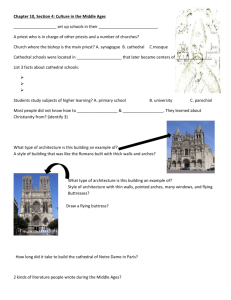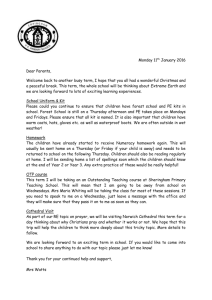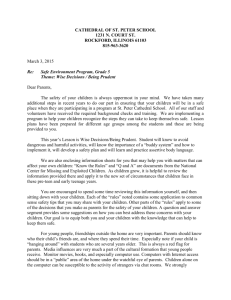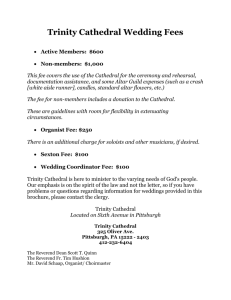Psalm 16-“The lot is fallen unto me in a fair ground: Yea, I have a
advertisement
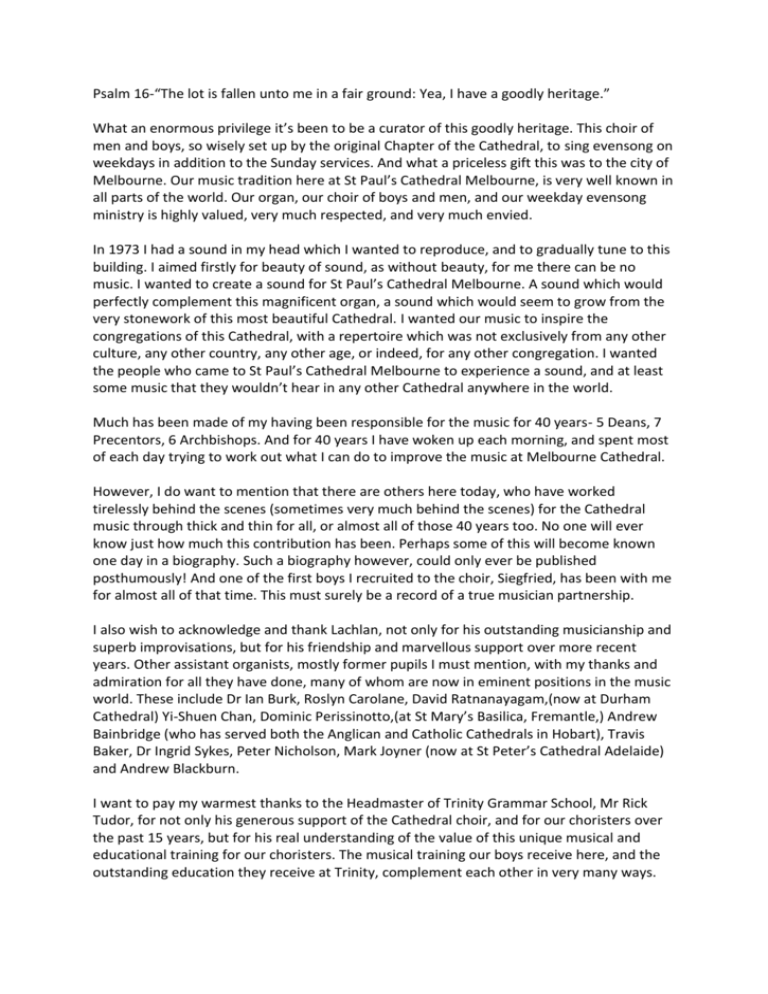
Psalm 16-“The lot is fallen unto me in a fair ground: Yea, I have a goodly heritage.” What an enormous privilege it’s been to be a curator of this goodly heritage. This choir of men and boys, so wisely set up by the original Chapter of the Cathedral, to sing evensong on weekdays in addition to the Sunday services. And what a priceless gift this was to the city of Melbourne. Our music tradition here at St Paul’s Cathedral Melbourne, is very well known in all parts of the world. Our organ, our choir of boys and men, and our weekday evensong ministry is highly valued, very much respected, and very much envied. In 1973 I had a sound in my head which I wanted to reproduce, and to gradually tune to this building. I aimed firstly for beauty of sound, as without beauty, for me there can be no music. I wanted to create a sound for St Paul’s Cathedral Melbourne. A sound which would perfectly complement this magnificent organ, a sound which would seem to grow from the very stonework of this most beautiful Cathedral. I wanted our music to inspire the congregations of this Cathedral, with a repertoire which was not exclusively from any other culture, any other country, any other age, or indeed, for any other congregation. I wanted the people who came to St Paul’s Cathedral Melbourne to experience a sound, and at least some music that they wouldn’t hear in any other Cathedral anywhere in the world. Much has been made of my having been responsible for the music for 40 years- 5 Deans, 7 Precentors, 6 Archbishops. And for 40 years I have woken up each morning, and spent most of each day trying to work out what I can do to improve the music at Melbourne Cathedral. However, I do want to mention that there are others here today, who have worked tirelessly behind the scenes (sometimes very much behind the scenes) for the Cathedral music through thick and thin for all, or almost all of those 40 years too. No one will ever know just how much this contribution has been. Perhaps some of this will become known one day in a biography. Such a biography however, could only ever be published posthumously! And one of the first boys I recruited to the choir, Siegfried, has been with me for almost all of that time. This must surely be a record of a true musician partnership. I also wish to acknowledge and thank Lachlan, not only for his outstanding musicianship and superb improvisations, but for his friendship and marvellous support over more recent years. Other assistant organists, mostly former pupils I must mention, with my thanks and admiration for all they have done, many of whom are now in eminent positions in the music world. These include Dr Ian Burk, Roslyn Carolane, David Ratnanayagam,(now at Durham Cathedral) Yi-Shuen Chan, Dominic Perissinotto,(at St Mary’s Basilica, Fremantle,) Andrew Bainbridge (who has served both the Anglican and Catholic Cathedrals in Hobart), Travis Baker, Dr Ingrid Sykes, Peter Nicholson, Mark Joyner (now at St Peter’s Cathedral Adelaide) and Andrew Blackburn. I want to pay my warmest thanks to the Headmaster of Trinity Grammar School, Mr Rick Tudor, for not only his generous support of the Cathedral choir, and for our choristers over the past 15 years, but for his real understanding of the value of this unique musical and educational training for our choristers. The musical training our boys receive here, and the outstanding education they receive at Trinity, complement each other in very many ways. Additionally, there have been very many boys who would never have gained a place at Trinity without the Cathedral choir. I have been so lucky. To watch young boys discover a whole new world of music, and within weeks, to see them become totally passionate about it. To enable some of them to continue to follow that passion and gain eminent and distinguished careers. To have been able to nurture this unique and outstanding organ, and to be able to see it through an acclaimed restoration. To have been able to work with a succession of clergy who recognise the value of our music ministry, as our “Opus Dei”. We musicians really only want one thing from our clergy, and that is to be trusted to do our job, then to be left alone to get on with it. However, if being left alone to get on with it comes with encouragement, support and appreciation for what we do, we flourish, and so does the music. I have been so lucky to have had a choir consisting of generations of genuine, highly committed men, boys and choir parents-just a lovely group of people to work with, and now to be able to hand on such a choir to my successors. And finally, but by no means least, I have been incredibly lucky to have had such an appreciative congregation. Here at the cathedral there has been barely ever a service, without someone expressing their appreciation and thanks for the music. It’s as if you instinctively understand that we musicians need encouragement in order to keep doing our best, and to continually strive to exceed our best. I have never, in 40 years, received even the slightest hint from our congregation that you would want us to succumb to any form of what is usually referred to as “dumbing down”. In addition, many are the letters from all over the world, from people who have visited and attended a choral service. And in recent months, I have been enormously humbled by the very many letters I’ve had wishing me well for the future. Much of this correspondence has revealed the effect our music has had upon people’s lives. So, thank you for all your encouragement and kind words. I am confident in being able to hand on to my successors the carefully nurtured, thriving and above all, incredibly precious musical ministry of St Paul’s Cathedral, Melbourne. I could probably do no better than to conclude with some words from one of the greatest composers of Cathedral music, Herbert Howells, “If we consider what music we should want to hear on entering a great Cathedral, we should surely, in describing our ideal, say first of all that it must be something different from what is heard elsewhere; that it should be a sacred music devoted to its purpose. A music whose peace should still passion; whose dignity should strengthen our faith; whose unquestioned beauty should find a home in our hearts to cheer us in life and death. What a powerful good such music would have”.
